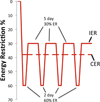Impact of intermittent fasting on health and disease processes
- PMID: 27810402
- PMCID: PMC5411330
- DOI: 10.1016/j.arr.2016.10.005
Impact of intermittent fasting on health and disease processes
Abstract
Humans in modern societies typically consume food at least three times daily, while laboratory animals are fed ad libitum. Overconsumption of food with such eating patterns often leads to metabolic morbidities (insulin resistance, excessive accumulation of visceral fat, etc.), particularly when associated with a sedentary lifestyle. Because animals, including humans, evolved in environments where food was relatively scarce, they developed numerous adaptations that enabled them to function at a high level, both physically and cognitively, when in a food-deprived/fasted state. Intermittent fasting (IF) encompasses eating patterns in which individuals go extended time periods (e.g., 16-48h) with little or no energy intake, with intervening periods of normal food intake, on a recurring basis. We use the term periodic fasting (PF) to refer to IF with periods of fasting or fasting mimicking diets lasting from 2 to as many as 21 or more days. In laboratory rats and mice IF and PF have profound beneficial effects on many different indices of health and, importantly, can counteract disease processes and improve functional outcome in experimental models of a wide range of age-related disorders including diabetes, cardiovascular disease, cancers and neurological disorders such as Alzheimer's disease Parkinson's disease and stroke. Studies of IF (e.g., 60% energy restriction on 2days per week or every other day), PF (e.g., a 5day diet providing 750-1100kcal) and time-restricted feeding (TRF; limiting the daily period of food intake to 8h or less) in normal and overweight human subjects have demonstrated efficacy for weight loss and improvements in multiple health indicators including insulin resistance and reductions in risk factors for cardiovascular disease. The cellular and molecular mechanisms by which IF improves health and counteracts disease processes involve activation of adaptive cellular stress response signaling pathways that enhance mitochondrial health, DNA repair and autophagy. PF also promotes stem cell-based regeneration as well as long-lasting metabolic effects. Randomized controlled clinical trials of IF versus PF and isoenergetic continuous energy restriction in human subjects will be required to establish the efficacy of IF in improving general health, and preventing and managing major diseases of aging.
Keywords: Alzheimer’s disease; Blood pressure; Cardiovascular disease; Diabetes; Insulin resistance; Intermittent fasting; Ketone bodies; Obesity.
Published by Elsevier B.V.
Figures



Similar articles
-
Meal pattern alterations associated with intermittent fasting for weight loss are normalized after high-fat diet re-feeding.Physiol Behav. 2017 May 15;174:49-56. doi: 10.1016/j.physbeh.2017.02.046. Epub 2017 Mar 3. Physiol Behav. 2017. PMID: 28263771
-
Intermittent fasting interventions for the treatment of overweight and obesity in adults aged 18 years and over: a systematic review protocol.JBI Database System Rev Implement Rep. 2015 Oct;13(10):60-8. doi: 10.11124/jbisrir-2015-2363. JBI Database System Rev Implement Rep. 2015. PMID: 26571283
-
Time-restricted feeding improves insulin resistance and hepatic steatosis in a mouse model of postmenopausal obesity.Metabolism. 2016 Dec;65(12):1743-1754. doi: 10.1016/j.metabol.2016.09.006. Epub 2016 Sep 22. Metabolism. 2016. PMID: 27832862 Free PMC article.
-
Fasting for weight loss: an effective strategy or latest dieting trend?Int J Obes (Lond). 2015 May;39(5):727-33. doi: 10.1038/ijo.2014.214. Epub 2014 Dec 26. Int J Obes (Lond). 2015. PMID: 25540982 Review.
-
Rationale for novel intermittent dieting strategies to attenuate adaptive responses to energy restriction.Obes Rev. 2018 Dec;19 Suppl 1:47-60. doi: 10.1111/obr.12787. Obes Rev. 2018. PMID: 30511512 Review.
Cited by
-
[Time-restricted eating as a novel strategy for treatment of obesity and it's comorbid conditions].Probl Endokrinol (Mosk). 2022 Jun 1;68(4):78-91. doi: 10.14341/probl13078. Probl Endokrinol (Mosk). 2022. PMID: 36104969 Free PMC article. Review. Russian.
-
Effects of Caloric Restriction and Intermittent Fasting and Their Combined Exercise on Cognitive Functioning: A Review.Curr Nutr Rep. 2024 Dec;13(4):691-700. doi: 10.1007/s13668-024-00570-8. Epub 2024 Sep 6. Curr Nutr Rep. 2024. PMID: 39240488 Review.
-
The Beneficial Effects of Dietary Interventions on Gut Microbiota-An Up-to-Date Critical Review and Future Perspectives.Nutrients. 2023 Dec 3;15(23):5005. doi: 10.3390/nu15235005. Nutrients. 2023. PMID: 38068863 Free PMC article. Review.
-
The Impact of Ten Days of Periodic Fasting on the Modulation of the Longevity Gene in Overweight and Obese Individuals: A Quasi-Experimental Study.Nutrients. 2024 Sep 15;16(18):3112. doi: 10.3390/nu16183112. Nutrients. 2024. PMID: 39339719 Free PMC article.
-
How do pregnant and lactating women, and young children, experience religious food restriction at the community level? A qualitative study of fasting traditions and feeding behaviors in four regions of Ethiopia.PLoS One. 2018 Dec 5;13(12):e0208408. doi: 10.1371/journal.pone.0208408. eCollection 2018. PLoS One. 2018. PMID: 30517203 Free PMC article.
References
-
- Ahmet I, Wan R, Mattson MP, Lakatta EG, Talan M. Cardioprotection by intermittent fasting in rats. Circulation. 2005;112:3115–3121. - PubMed
-
- Anastasiou CA, Karfopoulou E, Yannakoulia M. Weight regaining: from statistics and behaviors to physiology and metabolism. Metabolism. 2015;64:1395–1407. - PubMed
-
- Anson RM, Guo Z, de Cabo R, Iyun T, Rios M, Hagepanos A, Ingram DK, Lane MA, Mattson MP. Intermittent fasting dissociates beneficial effects of dietary restriction on glucose metabolism and neuronal resistance to injury from calorie intake. Proc. Natl. Acad. Sci. U. S. A. 2003;100:6216–6220. - PMC - PubMed
Publication types
MeSH terms
Grants and funding
LinkOut - more resources
Full Text Sources
Other Literature Sources
Medical
Miscellaneous

